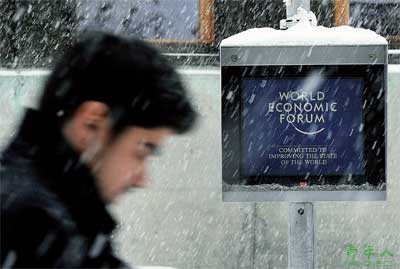
A man leaves the Davos Congress Center amid a heavy snowfall on the second day of the World Economic Forum annual meeting Thursday. Thirty heads of state and government and 2,500 business and academic elite started the 40th annual Davos forum to hammer out ways to fend off new storm clouds hanging over the global economy.
Calls for appreciation of the Chinese currency were renewed Thursday at the World Economic Forum in Davos, despite Beijing's explicit resolve to keep the yuan stable and allow it to float at its own schedule and pace.
At the annual gathering in the mountainside village in Switzerland, political leaders, bankers and financiers also seemed to share mounting concern over whether China was able to tackle an overheating economy.
Financier George Soros told reporters Thursday that the renminbi should "appreciate for the benefit of China and the world," the Wall Street Journal reported.
"The case for revaluing the renminbi is getting stronger and stronger," he was quoted as saying.
Soros also expressed scepticism about whether China would beat asset bubbles build-ing up in its economy.
"The jury is out," he said of China's efforts to contain high property prices and credit. The campaign will be "a major test for the Chinese government," AFP reported him as saying.
Chinese Vice-Premier Li Keqiang said Thursday that Beijing was ready to adapt its monetary policies to changing circumstances, and that it was confident of maintaining its rapid growth, according to AFP.
"We will maintain continuity and the stability of our macro-economic policies, continue to follow a proactive fiscal policy and moderately easy monetary policy and make our policies better targeted and more flexible in response to new circum-stances," Li said at the Davos forum. He was also upbeat that China's economy would continue its rapid growth.
"We are confident that we can ... maintain the steady and fast growth of the Chinese economy," he added
At an earlier panel, the deputy governor of China's central bank, Zhu Min, defended the country's currency policy, emphasizing the importance of the stability of the renminbi.
"It's very important to have a stable yuan, particularly in this very volatile market," he said, adding it is "good for China (and) also good for the world."
A fellow panelist, Barney Frank, chairman of the House Financial Services Commit-tee, followed by saying that the yuan can be stable just a bit higher in value, according to the Wall Street Journal.
In a speech on the first day of the forum Wednesday, French President Nicolas Sarkozy made a veiled attack against China, AFP reported.
"Currency is central to these imbalances," he said, adding, "Exchange-rate instability and the under-valuation of certain currencies militate against fair trade and honest competition," AFP quoted Sarkozy as saying.
Jeremy Jurgens, senior director of the Center for Global Growth Companies at the World Economic Forum, said, "The world is very much looking to China to better under-stand how China can stimulate domestic consumption without overheating. At the same time, China can only benefit from a sustainable recovery in the global economy."
China is blamed for artificially keeping the yuan weak against the US dollar.
A stronger yuan is thought to likely spur a massive inflow of speculative money, making liquidity management more difficult.
Zhu's remarks in Davos came as Zhong Shan, China's deputy minister of commerce, admitted that external pressure for the yuan's appreciation is growing, according to a speech transcript on the ministry's website.
"The yuan faces relatively intense anticipation for appreciation," Zhong said Tuesday at a nationwide working conference.
It has become increasingly difficult to maintain a consistent and stable macro-economic policy, as some of the stimulus plan will undergo adjustment, Zhong said.
He made few hints as to whether the yuan would appreciate this year, or in what form.
The government shifted to a moderately easy monetary policy in 2009 from a tight monetary policy in 2008 in a bid to counter the adverse impact of the global financial crisis. However, the lending surge and soaring housing prices have caused concerns of the risk of an assets bubble and increasing inflation.
China's economy in 2009 registered an 8.7 percent yearly growth, the National Bureau of Statistics said last week.
The country's foreign exchange reserves hit almost $2.4 trillion by the end of 2009, up 23.28 percent year-on-year, the central bank said.
Yu Yongding, an economist at the Chinese Academy of Social Sciences, noted that the country's economic expansion last year gave strong impetus to the global recovery.
"Many Asian nations were beneficiaries of China's massive stimulus plan and fast-growing imports," Yu said.
"The world is anxious that the burst of asset bubbles could lead to a collapse of China's economy and the global recovery will lose its key driving force," Yu said, adding that the concern itself may reflect China's increasingly significant role in the world economy.
Liu Bin, a Dalian-based economist, noted that time for the yuan's revaluation has not come.
"A further appreciation will result in a sharp fall in exports and impact on imports as well. It will hurt the global economy," Liu said.
China should not yield to any foreign pressure on the issue, Liu said.
Kang Juan contributed to this story
责任编辑:sealion1986
